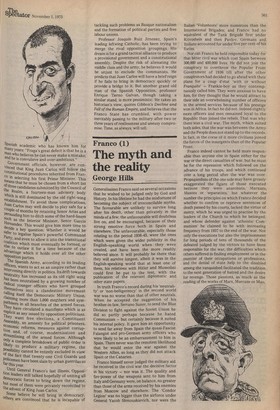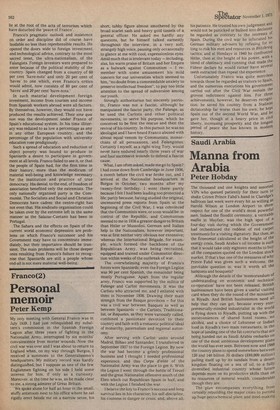Franco (1)
The myth and the reality
George Hills
Generalissimo Franco said on several occasions that he wished to be judged only by God and History. In his lifetime he had the misfortune of becoming the subject of irreconcilable myths. The favourable are unlikely to survive long after his death, other than privately in the minds of a few; the unfavourable will doubtless live on, and be encouraged, because of their strong emotive force both in Spain and elsewhere. The unfavourable, especially those relating to the period 1936-45, were the ones which were given the wider publicity in the English-speaking world when they were created, and have been the more readily believed since. It will probably be there that they will survive longest, albeit it was in the English-speaking world that at least one of them, his relations with Hitler and Mussolini could first be put to the test, with the publication of the relevant diplomatic and other state papers..
In truth Franco's record during his 'neutrality' or non-belligerency' in the second world war was no worse than that of other neutrals. When he accepted the suggestion of his brother-in-law, Serrano Suner, to send the Blue Division to fight against the Soviet Union he did so partly perhaps because he hated Communism — but certainly because it suited his internal policy. It gave him an opportunity to send far away from Spain the quasi-Fascist Falangist and pro-German army officers who were likely to be an embarrassment to him in Spain. There never was the remotest likelihood that he would enter the war against the Western Allies, so long as they did not attack Spain or the Canaries.
Franco himself never judged the military aid he received in the civil war the decisive factor in his victory — nor was it. The quality and fire-power of the weapons sent to him from Italy and Germany were, on balance, no greater than those of the arms received by his enemies from Moscow and elsewhere. The 'Condor Legion' was no bigger than the airforce under General Yacob Shmouskievich, nor were the Italian 'Volunteers' more numerous than the International Brigades; and Franco had no equivalent of the Tank Brigade first under Krivoshein and then Pavlov. Germans and Italians accounted for under five per cent of his forces.
Nor can Franco be held responsible today for that bitter civil war which cost Spain between 300,000 and 400,000 lives. He did not join the conspiracy to overthrow the Popular Front Government of 1936 till after the other conspirators had decided to go ahead with their plans for a coup d'etat 'with or without Franquito' — Frankie-boy as they contemptuously called him. They were anxious to have him, for they thought that he would attract to their side an overwhelming number of officers in the armed services because of his prestige won in Africa. In fact he did not. Indeed slightly more officers and men remained loyal to the Republic than joined the rebels. That was why there was a civil war. The myth, which suited both sides, that the war was between the Army and the People does not stand up to the records. In fact, in the corse of it more civilians joined the forces of the insurgents than of the Popular Front.
Franco indeed cannot be held more responsible than anyone else in Spain either for the war or the direct casualties of war, but he must be for the repression which followed on the advance of his troops, and which continued over a long period after the war was over. Propagandists of the one side may have grossly exaggerated the figure of those executed necause they were anarchists, Marxists, Masons or 'separatists,' but whatever the number the principles on which Franco decided whether to confirm or reprieve sentences of death passed by his courts, lacked the virtue of mercy, which he was urged to practise by the leaders of the Church to which he belonged, and whose defender against 'atheistic Communism' he claimed to be with increasing frequency from 1937 to the end of the war. Not only the executions but also the imprisonment for long periods of tens of thousands of the defeated judged by the victors to have been responsible for the war, the difficulties which others suffered in finding employment or in the exercise of their occupations or professions, and the denial of state help to the disabled among the vanquished facilitated the tradition to the next generation of hatred and the desire for revenge. Those passions, as much as the reading of the works of Marx, Marcuse or Mao, lie at the root of the acts of terrorism which have disturbed the 'peace of Franco'.
Franco's pragmatic outlook and insistence on order and discipline did of course have laudable no less than reprehensible results. He opened the doors wide to foreign investment and technological advice, contrary to the most sacred tenet, the ultra-nationalism, of the Falangists. Foreign investors were prepared to enter because of the political stability of the country. Spain changed from a country of 80 per cent 'have-nots' and only 20 per cent of 'haves' to one which, even Franco's critics would admit, now consists of 80 per cent of 'haves and 20 per cent 'have-nots.'
In such material development foreign investment, income from tourism and income from Spanish workers abroad were all factors. By themselves, however, they would not have produced the results achieved. Their sine qua non was the development under Franco of Spain's educational system. In his time illiteracy was reduced to as low a percentage as any in any other European country, and the percentage of the population with university education rose prodigiously.
Such a spread of education and reduction of abject poverty was bound to produce in Spaniards a desire to participate in government at all levels. Franco failed to see it, or that the people of Spain had, for the first time in their history, more than the modicum of material well-being and knowledge necessary for the institution and practice of true democracy. His denial, to the end, of freedom of association benefited only the extremists. The only nationally organised party is the Communist. The Socialists and Social and Christian Democrats have cadres: the centre-right has not even that. His sindicato organisation could be taken over by the extreme left in the same manner as the Salazar-Caetano has been in Portugal.
The Sahara and the effects on Spain of the current world economic depression are problems on which Franco's successor and his Government may have to concentrate immediately, but their importance should be transient. The main problems will be those deeper ones resulting from Franco's failure to recognise that Spaniards are still a people whose end-all is not mere material well-being.

































 Previous page
Previous page